|

Peter Henry Emerson
George Eastman House
Still Photograph Archive
_______________________
Poems
Robin Blaser
a bird in the house
from Streams II
Robin Blaser
the truth flies hungry, at least and otherous,
of which--though it may be one--Kafka said troublingly,
it has many faces
it's
the faces one wants, tripping the light shadows of its
skin colours of its wordy swiftness, angry and solvent,
of its loud remarks
as of feeding flocks one
year, one, among the smallest birds in the Northwest, flew
into the house a darting, panic thought at the walls
and grasses perched on the top right corner of the frame
of Tom Field's painting wherein adulterous Genji is found
out--as Lady Murasaki reads from her blue scroll--and
permitted me to take it in my hand soft, intricate
mind honouring and lift it out into the air
and the next year, again, one flew into the house,
almost certain, like a visitor, gold-crowned winged
floating about odd discoveries and alighted on the brim
of the lasagna dish my hand trembled as I took it up
and moved slowly to lift it out of the window into
the air a kind of thinking like everybody else
looking for a continuing contravention of limits and
of substance
for Sharon Thesen
...(more)
Poetries of CanadaEdited by Jack Kimball & David Bromige The East Village Poetry Web Volume Four
_______________________
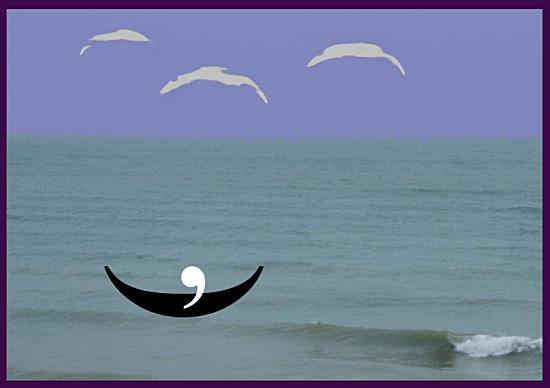
Selected Work
Márton Koppány
maintenant #69 – márton koppány
An interview with Márton Koppány by SJ Fowler.
3am
Waves
Márton Koppány
E·ratio Poetry Journal
Fabulist of the surface
Márton Koppány and the shimmer of meaning
Gary Barwin
jacket2
(....)
Márton Koppány’s deceptively simple images, are comprised of the small visual symbols of our modern life: yes, ellipses, quotation marks, and speech balloons, but also everyday objects such as a chair, a fish, some sunglasses. But he doesn’t attempt to represent these things, but rather presents simple photographs of them. It’s our clipart-world, our JPGscape. And these images — from the language of words or the language of visuality — play together on a flat field comprised of simple unmodulated colours. They live in that unhurried purgatory of the semantic present, living out the relationships of unworried signs in an semiotic utopian playground without hierarchies. Yes, they interact. Speech balloons and ellipses point to notions of speech and ellipticality. Fish seem to swim in the visual field. Commas remind us of the messy and complex world of language which they have opted out of, or have — at least for now — left to join a visual commune.
But his work also speaks to the surface. Language is a Mobius strip. It’s all surface, yet we know that it’s actually a trick: this surface has two sides—it's three dimensional after all.
(....)
Much of Koppany’s work seems to assume the form of an uninterpretable allegory. A fable without clear moral or referent. It is about fablicity. About the rich depths of surface. About puzzling over. The shimmer of meaning. These texts aren't just inscrutable or ambiguous ideographs, asemic, parasemic or hemidemisemic visual symbols without clear meaning, but poetic tableaux. They are single moments from a rich and complex narrative, stills from the cinema of language. Visual koans.
...(more)
_______________________

a toad in the path
1888
Peter Henry Emerson
1856 - 1936
_______________________
Infrastructure, Infra-politics
An excerpt from Contract & Contagion: From Biopolitics to Oikonomia
Angela Mitropoulos
(....)
Infrastructure, after all, is about how worlds are made, how forms of life are sustained and made viable. To think politics as infrastructural is to set aside questions of subjectivity, identity, demands, promises, rights and contracts, and instead to render visible the presumptions that the knots of attachment, adherence, care or fondness and have already been tied by nature or supposedly incontestable forms of connection (by kinship, race, money, sexuality, nation, and so on). The materialities of infrastructure render it the most pertinent political question there is. Everything else is distraction. Infrastructure is the undercommons – neither the skilled virtuousity of the artisan, nor regal damask, nor the Jacquard loom that replaced, reproduced and democratised them, but the weave.
...(more)
_______________________
 Ricking the Reed
Peter Henry Emerson
1886
_______________________
Collective Stockholm Syndrome — We Love, Respect, Protect Our Abusers
Paul Haeder
It’s a tough day in the neighborhood. Slip-streaming through the great big rot of the century. Cities are burning. Youth and pensioners are rebelling. The elite and media prostitutes are flailing away. Blame-blame-blame truth tellers, whistle blowers, the people in pain. Collective PTSD. False dichotomies like Ebola. Spreading mistruths, empty visions, and one more million scams by the Chamber of Commerce-Political Mafia Group of One Thousand. Lies about the vision of IT, the value of on-line schools, the death of inequality.
It sounds like we are a pugnacious society, but it’s all smoke and mirrors and Fox News and goofy blogging and Jon Stewart smarmy millionaire telling us, radicals, what we are. We even have to hire on and throw billions at people to be our voice boxes, or produce our reality TV great dying off.
Silly one-liner nation. Flaccid, stuck in the eat-drink-screw-entertain-be-merry mode.
We are now the generation of Retailopithecus Eructus. Our collective serotonin and dopamine receptors are fried. We in-put more buzz-feeds, more endless tweets and slimy headline, until lo and behold, we are the products of product merchandising. Koch Brothers Rule Both Parties and the Public Network. Gates-Bezos-Zuckerberg-Google-Geeks work with the masters of the Universe in the Fortune 500 League, with the US DoD and NSA and CIA and POTUS and the SCOTUS to fabricate a five-generation upending labor of pain.
Pre-crime is here to stay. We in the 80 Percent, we all are suspects, perps, persons of interest, felons-to-be, reneging on credit. Our work is our prison. Food and dining and Big Gulps on laps while we whistle Dixie in gridlock in our sweat-labor SUVs watching city street after city street look like a scene from Blade Runner, except this America is the America of low sperm count, faux feminism, selling man, woman and child to the highest bidder dude and dudette.
...(more)
_______________________
Formal Letter To The Macabre American Value System
Henri Bergotte
... I spent my childhood watching my father sweat and suffer for some mystical day who knew how far off in the future. That day, like any other, and which arrived on the wings of an official envelope – that day when the check simply shows up in the mailbox with his name in ink on the front.
And yet, despite his validation, even he knows that this road has ended. He chalks up the time he put in to ‘the way things were done.’ It’s what he was taught to do – to ‘get ahead’ and out of dire poverty and in this one instance, gray hair and half a back later, it worked. Statistically speaking, it can’t happen again for 172 years. In short, good reasons for wearing chains are becoming harder and harder to find these days.
Furthermore, I have no interest in moving beyond my class. I know this is tantamount to blasphemy, so I’ve sung the national anthem just to be safe. There are two reasons for this insult to idolatry:
The first is that I am aware of the fictitious nature of the whole ‘three classes’ idea. I know that the middle class is a meaningless term invented to encourage the continuation of the systematic servitude of millions. I also know that there are really only two classes: rich and poor, haves and havenots, capitalist and working. I know my place and I like it fine.
The second is that in order to truly move beyond my class, undignified activities would become necessary as the norm: exploitation, indirect torture and forced starvation, maybe even manslaughter – these my daily trade in order to cast off the weight of the working class week.
Now should I refuse to undertake these demands and yet still wish the satisfaction of working towards some idyllic upper class future, then I am basically living a lie. Not uncommon these days, living a lie, and certainly more socially acceptable than living a truth, but a life of falsehood nonetheless.
...(more)
theEEEL Electric Encyclopedia of Experimental Literature.
theNewerYork_______________________

Gunner Working up to Fowl
1886

The Prairie
Laura Gilpin
1917
_______________________
[23 July 2013]
If you open a word
who knows what you might see
Cagliostro’s fatidic circle
a language made of bees
green shelf ice off Labrador once
every word a dream
open the door it is and dream it.
Mill Of Particulars:
The bLog of Robert Kelly
_______________________

Storm at La Bajada
1946
Laura Gilpin
1891 - 1979
1 2
Laura Gilpin and the Tradition of American Landscape Photography
Martha A. Sandweiss
_______________________
An Anarchistic Understanding of the Social Order:
Environmental Degradation, Indigenous Resistance and a Place for the Sciences
Andrew Gavin Marshall
(....)
An anarchistic understanding of the institutions and ideologies which control the world order reveals a society blinded by apathy as it nears extinction. The institutions which dictate the political, economic and social direction of our world are the very same ones destroying the environment to such an extent that the fate of the species is put at extreme risk. To not only continue – but to accelerate – down this path is no longer an acceptable course of action for humanity. It is time that socially segregated populations begin reaching out and working together, to share knowledge, organizational capacity, and engage in mutual action for shared objectives. With that in mind, it would appear to be beneficial not only for those involved – but for humanity as a whole – if Indigenous peoples and segments of the scientific community pursued the objective of protecting the environment together. Acknowledging this is easy enough, the hard part is figuring out the means and methods of turning that acknowledgement into action.
This is again where anarchist principles can become useful, emphasizing the creative capacity of many to contribute new ideas and undertake new initiatives working together as free individuals in collective organizations to achieve shared objectives. This is not an easy task, but it is a necessary one. The very future of humanity may depend upon it.
...(more)
Anarchy and Non-Profit: An Emerging Affair [pdf] Spanda Journal Vol. 4, No. 1, 2013
_______________________

Black Mesa
Laura Gilpin
1952
_______________________
Middle Games and Possible Communisms
Ryan Culpepper reviews Lucio Magri. The Tailor of Ulm: Communism in the Twentieth Century. Trans. Patrick Camiller.
(....)
Gramsci’s ideas were so much a theoretical touchstone for Magri and the entire PCI that Magri calls them “the Gramsci genome . . . a part of the genetic material” (38). And Gramsci, like Lenin before him and Magri after him, always insisted on the absolute requirement to dialectically reconcile daily politics (the “spontaneity”) with the science of history (i.e. Marxism, which demands “disciplined” action).
This reconciliation—praxis in its purest form—is necessarily messy and requires constantimprovisation: re-thinking as well as re-organization. But it cannot occur without a stable locus committed over the long term to the work of reconciliation. The question for politics today is where, if not in the old Party form, such a locus can exist. Magri, for his part, is not at all interested in a restoration of the PCI or any other 20th century mass Party, nor is The Tailor of Ulm an apologia for the many failings of the PCI, which Magri takes pains to catalogue. It is, however, a historically grounded defense of the basic Marxist-Leninist principle that, on the path to communism, the stage of proletarian control over existing institutions—the means of production and the structures of state power—during which time these institutions are re-tooled and re-directed to create a material basis for communism, cannot be foregone. Disconnected acts of destruction and negativity are insufficient; merely destroying the state or the factory will do nothing to usher in non-exploitative social relations, and it risks, moreover, wholesale acquiescence to the barbarism that already exists in current social relations as modernity’s (“enlightenment’s”) dialectical twin. This was the truth of the old Wobbly slogan “building a new society in the shell of the old” and what prompted Gramsci to theorize the “historical bloc” in the first place. Magri says it this way:
To challenge and overcome such a system [21st century global capitalism], what is required is a coherent systemic alternative; the power to impose it and the capacity to run it; a social bloc that can sustain it, and measures and alliances commensurate with that goal. Much as we can and should discard the myth of an apocalyptic breakdown, in which a Jacobin minority steps in to conquer state power, there is still less reason to pin our hopes on a succession of scattered revolts or small-scale reforms that might spontaneously coalesce into a great transformation.
...(more)
Reviews in Cultural Theory
via I cite
_______________________
In the Good Old Summer Time
Michael Ruby
—For Mary Ford
In the good old lemon elegance
Megalomaniacal summer time
In the good old elastic blueprints
Soft real estate this summer time
Strolling through Tory bottomland
Morgan melted the shady
And dice prolong the lane
With seasoned eaglets
Mexican blues your baby
Mandarin professionals mine
You hold premium soda
Heartless tupelos plagued her hand
Press plastic and she
Belted ice monster holds yours
And that’s a precious peace sign
Diamond horseshoes a very good sign
That she’s red sugar
Almonds mask your tootsie wootsie
In the good old placement soup
Solomonic summer time
Three poets
The StraddlerIssue Eleven summer2013
Digital Proletariat:
The Spectacle of the "Internet" and Labor's Dispossession Michael Pepi
_______________________

Footprints in the Sand
Laura Gilpin
1931
_______________________
On Printing Out the Internet
Kathryn Mockler
lemon hound
“…capitalism has a knack for devouring and absorbing everything in its path—including any critique of capitalism.”
(from Notes on Conceptualisms)
When I taught an experimental writing course to undergraduates this past winter my students and I were most surprised to discover, through some of the class exercises, the extent to which we are not free to express ourselves. There is a disconnection between our perception of our rights and freedoms and what we are actually allowed to do and say. Unless we are trying to push these boundaries, it is often something that goes unnoticed.
(....)
In Notes on Conceptualisms, Vanessa Place and Robert Fitterman maintain that the aim of appropriated conceptual writing is not to “critique the culture industry from afar, but to mirror it directly. To do so, it uses the materials of the culture industry directly.” Therefore by reframing the internet—by changing its essence from fluid to concrete—and asking us look at it from a different point of view, Goldsmith is holding up a mirror and turning on a light so that we may see ourselves more clearly. The discussion arising from this reflection helps us to analyze and critique the culture.
Printing Out The Internet asks us to look at something right in front of our faces that we don’t talk about in a meaningful way. It asks us to look at how being online plays a role our lives and what it means to make something as intangible and all encompassing as the internet into something tangible (a printed sheet of paper) in an era when everything is digital and many are lamenting the death of the book as physical object?
...(more)

Canadian Pacific #3
2000
From the series Westward the Course of Empire
Mark Ruwedel
_______________________
It Must Be Sophisticated
John Ashbery
b. July 28, 1927
There are attics in old houses
where doubt lingers as to the corrosive
effect of night-blindness: namely
are its victims directly linkable to a chain
of events happening elsewhere? If so,
we should shrug off resemblances
to our line of work. What was said around
the house had undue influence on one of several
shapely witnesses. And, as dames do,
she started talking to any and every
interlocutor out of harm's way. One day
you wake up and they've skipped. Or was it
always empty like this? It's hard
to remember a time when it wasn't. Maybe
your memory's playing tricks on you? Maybe
there never was such a person as Lisa Martins?
Maybe it's all over when you stand up
to walk the last mile in Enna Jettick shoes,
and they draw the blind quickly to forget you.
Once forgotten you're as good as dead,
anyway. And who would help you now?
You might as well be trapped at the bottom of a well
in the Sahara. They don't know you're alive,
or that your life was anything but exemplary
when it came time for you to live.
...(more)
_______________________

Palette, Shipmodel, and Fruits
1931
Max Gubler
May 26, 1898 - July 29, 1973
_______________________
Twenty-nine clouds. At twenty-nine a man was in his thirtieth year. And he was twenty-nine. And now at last, though the feeling had perhaps been growing on him all morning, he knew what it felt like, the intolerable impact of this knowledge that might have come at twenty-two, but had not, that ought at least to have come at twenty-five, but still somehow had not, this knowledge, hitherto associated only with people tottering on the brink of the grave and A. E. Housman, that one could not be young forever — that indeed, in the twinkling of an eye, one was not young any longer. For in less than four years, passing so swiftly to-day's cigarette seemed smoked yesterday, one would be thirty-three, in seven more, forty; in forty-seven, eighty. Sixty-seven years seemed a comfortingly long time but then he would be a hundred. I am not a prodigy any longer. I have no excuse any longer to behave in this irresponsible fashion. I am not such a dashing fellow after all. On the other hand: I am a prodigy. I am young. I am a dashing fellow. Am I not? You are a liar, said the trees tossing in the garden. You are a traitor, rattled the plantain leaves.
Under the Volcano
Malcolm Lowry
July 28, 1909 - June 26, 1957
_______________________
Brushing the Silence:
The Politics of Urban Articulation in Nicole Brossard’s Notebook of Roses and Civilization
Hannah Weber
lemon hound
(....)
“Finding paths through a city or a language has always been a political act,” (Lisa) Robertson says, and in the most tangible sense we might imagine a woman whose day is night, whose paths are shrouded in silence, whose profession (and existence) is denied validity, denied institutional integration, and denied recognition. Nancy addresses the seemingly hopeless task of breaking cyclical silence, stating,
community, in its infinite resistance to everything that would bring it to completion…signifies an irrepressible political exigency, and that this exigency in its turn demands something of “literature”, the inscription of our finite resistance.
The act of articulation and the urban institution are mutually constitutional, making the insurgence of the silent a problematic silence. But nothing escapes the political, either by inclusion or exclusion. For the silent to achieve an urban space and a method for speech, the move must first be made inside where articulation is already realizable.
Brossard’s Notebook of Roses and Civilization is simultaneously engaged in the distinctly feminine and the traditionally masculine, a discourse of the civil and who or what may articulate urbanity. She recognizes the impossibility of the literary shedding politics and responds to Nancy’s demand for resistance in forging the articulated community, not simply content that “brush[es] the silence.” She presses on to enunciate the “deletions”; if in silence they are unable to speak, the poet must then speak silence for them.
...(more)
_______________________
 Photographer: Gijsbert Hanekroot/Redferns
Remembering J.J. Cale
(December 5, 1938 - July 26, 2013)
with a 1979 Concert
open culture
_______________________
The Intellectual Construction of "Social Distance":
Toward a Recovery of Georg Simmel’s Social Geometry
Philip J. Ethington
Cybergeo : European Journal of Geography
If wandering, considered as a state of detachment from every given point in space, is the conceptual opposite of attachment to any point, then the sociological form of the ‘stranger’ presents the synthesis, as it were, of both these properties. (This is another indication that spatial relations not only are determining conditions of relationships among men, but are also symbolic of those relationships.)
Georg Simmel, "The Stranger" (1908)
(....)The relationship between geometric and metaphoric distance should be among the most urgent of research questions in late-twentieth century human sciences. This essay is an attempt to contribute to the ongoing and increasingly rich discourse on space in social theory, by tracing the life course of a critical concept as it has been constructed intellectually and deployed empirically. That social distance needs to be refashioned is a major conclusion of this essay, but precisely how it must be refashioned is a question that I think we are only beginning to see. Not only Georg Simmel among the founders of social theory will be necessary for this reconstruction. Emile Durkheim’s concept of "social morphology," for example, contains important insights into the relationship between geometric and metaphoric meanings of distance. This essay, however, maintains a focus on Simmel, Park, and Bogardus as shapers of the contemporary notion of "social distance."
(....)
Simmel had the brilliance to capture in a single social type, “the stranger” the basic elements of social distance. Metaphoric distance is strangeness: the “unfamiliar” (and we must take note of the etymologies here: familiar and unfamiliar are metaphoric of blood kinship). But geometric distance is the structure of everyday life in space-time that permits or promotes the formation of familiarity: ie, the stranger literally was not here when we developed our familiarity. Reciprocally, “structures of feeling” produce “structures of practice”, and vice-versa. A powerful exploitation of recent sociospatial theory needs to accommodate directly both of these senses of distance....(more)
_______________________

Dusk #33 (Antelope Valley #294B)
2010
From the series Dusk
Mark Ruwedel
Yossi Milo Gallery
_______________________
Anarchist Studies
Volume 21 | Number 1 | 2013
Toward a Peak Everything [pdf]
Postanarchism and a Technology
Evaluation Schema for Communities
in Crisis
Ben Brucato
Abstract:
Communities everywhere are already in crisis as a result of the twin threats of peak everything and climate change. Th ese threats will pressure all future organisa- tions of the technological base. Th is presents opportunities for careful and intelligent intervention. Th ough some forms of environmental crises are certain, the timing and severity of these remain unclear and will likely provide unique challenges to varying climate and socio-economic contexts. A variety of probable environmental scenarios will constrain the range of potential political interventions. In this article diff erent orientations to the interacting crises, with focus toward possible reorganisation of the technological base, are considered. Th rough a brief discussion of environmen- tally-oriented anarchist politics, postanarchism, and radically democratic politics of technology, I fi nd new directions for an anarchist politics of technology prepared for the short- and long-term responses to the crises. I demonstrate these politics through a set of practicable evaluative questions for assessing new and existing artefacts and systems. In doing so, I provide not only the beginnings of an analytic theory of tech- nology, but also an evaluation-oriented experimental schema.
Whose Streets? Anarchism, Technology
and the Petromodern State [pdf]
Michael Truscello and Uri Gordon
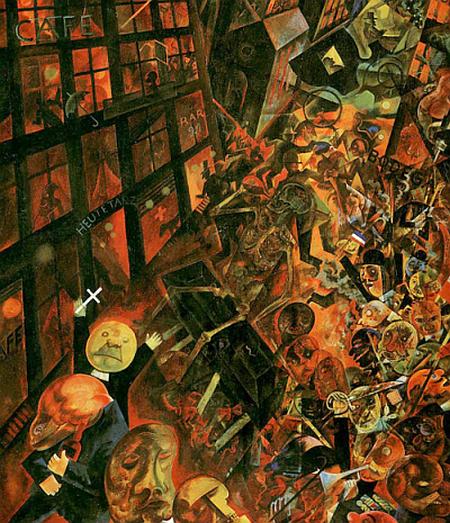
George Grosz
(July 26, 1893 – July 6, 1959)
_______________________
Nineteen Short Poems for Bill Bronk, Plus One
Mark Weiss
presented by Jerome Rothenberg
SOMETIMES
Sometimes an insistent picture presents itself and sometimes
one walks
into and through it like a tracking shot, but it's always
a picture. Even at a moment like this when I summon it what's lost
is the swift melding of things unseen. And sometimes
it's the slow dance
of two and the heat
and cold and a hand
one remembers, does it all
come back does it all
come back to.
Doesn't it all come back to loss and language?
What can be done
in a few words,
what can be done in words.
Body
and words
in deep storage.
Think of the street filled
with extras in storied lives,
for each of whom...
for each of whom in storied lives
in the moments between.
And the smells of these.
The skull's rictus.
These are the marble halls I dreamt I dwelt in.
Add another to the cacophony of voices.
Add another.
...(more)
_______________________
The Brooklyn Quarterly
A magazine of literature and public ideas
Preview Issue - July 2013
Our Civic Religion
an interview with Chris Hayes
(....)
Is it a fair interpretation of your argument that ‘60s meritocracy introduced a higher degree of social equality to race, gender, and, increasingly, sexual orientation into our system, making the higher economic inequality palatable to a segment of society?
CH: I think it broadly had that effect. The idea that the rich deserve what they have predates creation of our current meritocracy. It’s partly an inheritance of feudalism and of a certain kind of Calvinism and Protestantism. I think it deeply structured our conceptions of just deserts and fairness to think this way. The division between equal opportunity and equal outcomes is just a trope that is casually invoked by everyone across the political spectrum — of course we want one and not the other.
That kind of neat conceptual division lets us evade a lot of questions like: How much did this hierarchical way of thinking of the world influence the success of progressive social movements — second wave feminism, civil rights, and LGBT rights — in achieving social equality?
...(more)
_______________________
Blasting the Canon
Anarchist Developments in Cultural Studies
No 1 (2013)
The Canon Which is Not One
Leonard Williams
Abstract
Thinking about an anarchist canon focuses on a number of issues: whether or not such a canon exists; questions of identity and boundary maintenance; concerns about representation. This essay addresses these questions by exploring not only what constitutes a canon, but also how one emerges and what purposes it might serve. We generally turn to a canon as an aid for either understanding or changing the world before us. Anarchist canons thus develop not only around texts and theorists, but also around events and practices—yet, no canon can claim universality; each one is inherently limited and skewed. How then can we avoid the dangers posed by a reified canon? These risks can be mitigated, initially, by regarding a canon as a tool kit enabling us to understand the tradition and gain some leverage for contributing to it. Second, we can subject any canon that does emerge to questioning and challenge. A third approach is to pay attention to activists’ concerns and the cultural products that reflect on their practices. Finally, whenever we encounter an established canon, we must test its worth by assessing whether or not it speaks to our condition.
_______________________
The Shameful State of Our Media Literacy
Bert Archer
hazlitt
Putting Dzokhar Tsarnaev on the cover of Rolling Stone was not a bad move. It did not make terrorism seem sexy. It wasn’t even sensationalistic. The widespread outrage from the egregious misreading of that cover, before the story was even put online, went beyond absurd into the profoundly worrisome.
We have, apparently, turned into a culture of media idiots.
_______________________
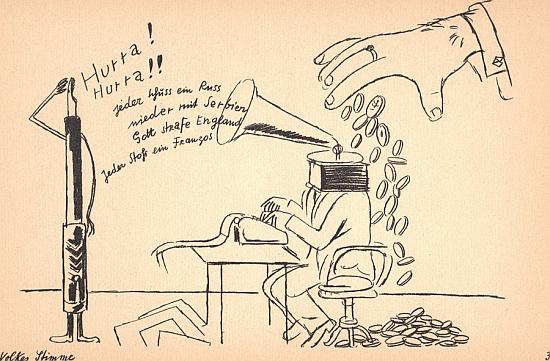
Hintergrund
George Grosz
for a 1928 German performance of The Good Soldier Žvejk
Richard Sica
50watts
_______________________
The Translator
Jacques Gélat
Translated from French by Edward Gauvin
words without borders
I always proceed in the same manner. Once the book is in hand, I shut myself away at home. I wait till dark to start reading. At night, the violence of the outside world subsides; you’re that much more available. Seated at my desk, I read by a lamp that gives off a very soft glow: it’s a first date, a kind of candlelit dinner, hope for potential seduction, for pleasure to come. That’s all I’m hoping for—to be charmed.
For that to happen, I must start by forgetting what I will have to translate. I tend instinctively to spot words or phrases that will pose a problem. But I forget them easily. Forgetting can be as much a virtue as a defect. Here, it is a gift. I let myself be swept away, I surrender myself to the author, I let him do as he wishes, I haven’t the right to impede him, he’s always right; to resist him, to bicker, would be the beginnings of infidelity, and for a translator, infidelity is the worst of crimes. This first reading must stay with me. It tells me what’s essential: the music of the book. I keep listening to this for the next few days. I must not forget it. And then, I begin to translate.
In this way, the author and I form a happy couple. Then why, one day, did I tear it apart? Why did I betray? Why did I grow unfaithful? Let us return to forgetting, virtue or defect, and in any case an essential part of myself, since it is how all this began. I committed an act of forgetting. A trifling one. So trifling another word is required. Infinitesimal, for example. I forgot a semicolon.
...(more)
_______________________

photo - mw

Bill Brandt
1939
_______________________
Malone and the murmur of language..
Mark Bowles
"..too am in perpetual motion, accompanied by Malone, as the earth by its moon. "
"Me, utter me, in the same foul breath as my creatures? Say of me that I see this, feel that, fear, hope, know and do not know? Yes, I will say it, and of me alone."
(Beckett, The Unnameable)
Yes, I will say it, and of me alone
It's hard not to hear, in 'me alone', the echo and presence of 'Malone', so that we hear the supervention of an other at the very moment of self-assertion. What matters, then, is not what is stated in the sentence, but what happens in the sentence: the ghostly reappearance of Malone, the murmur of language that stains even the clearest I. What is given in the sentence is not its propositional content* but the ventriloquism that takes place when we use language - and which is perhaps the very theme and substance of "Texts for Nothing").
...(more)
_______________________
Work without Hope draws nectar in a sieve,
And Hope without an object cannot live.

Samuel Taylor Coleridge
(21 October 1772 – 25 July 1834)
life mask
A Soliloquy of the Full Moon, She Being in a Mad Passion
Samuel Taylor Coleridge
Now as Heaven is my Lot, they're the Pests of the Nation!
Wherever they can come
With clankum and blankum
'Tis all Botheration, & Hell & Damnation,
With fun, jeering
Conjuring
Sky-staring,
Loungering,
And still to the tune of Transmogrification--
Those muttering
Spluttering
Ventriloquogusty
Poets
With no Hats
Or Hats that are rusty.
They're my Torment and Curse
(....)
And still Heaven be prais’d! in contempt of the Loon
I am I myself I, the jolly full Moon.
...(more)
_______________________

Meine Freundin Elis
1919
Otto Dix
2 December 1891 – 25 July 1969
_______________________
Tony
Kara Levy
drunken boat
The stranger’s arms slice the air as he does the robot. This is a date. The dark bar shines and our pints glow gold, and there is a strong musky perfume in the air, not mine, like we are in the bathroom of a beautiful woman. People don’t know how to greet Tony, and sometimes they dance the robot. I can’t blame them. They are like aliens on Tony’s Earth, trying to speak his language.
Tony stands behind my bar stool, waiting in the off position. When I first built him he did not insist on coming everywhere with me, but now he feels it’s best, for my protection. He doesn’t trust men. Alone at home, while Tony is giving me my injections, swabbing my stomach or my leg, he is as gentle as a lover. My friends are amazed at the softness of his touch. I tell them, with pride, that I built him that way.
The morning Mark left me was an injection morning. He was polite in the doorway with his packed bag, the way people are always polite to the sick, like we are cobwebs that might break if we are blown on. After the door closed behind him I went to the refrigerator and calmly took out the needle. I had watched Mark inject me for two years, bending his head close to my abdomen and easing the needle into the fleshiest piece, his ear so close to my navel that he could be listening, if ours were that kind of love. I knew the flaky part in his hair by heart. In my own hand, though, the needle felt strangely light, like there could not possibly be enough matter in there to change the course of a human body.
In the end, the metal tip cold against my skin, I couldn’t do it, even though all it would take was a breath and a plunge. I called my sister to come over on her lunch break. She had never injected me either, and was sloppy and hard about it in her work suit on her nyloned knees in my kitchen, one-two-three-jab, her lips pursed tight like this was a noble science and she was an expert.
That was the day I began building Tony.
...(more)
how Kara Levy's familiarity with chronic illness informs her storytellingHelene Wecker
(....)
For over a decade, Levy has been using her familiarity with illness to power her writing, a series of no-holds-barred examinations of what it’s like to be sick in a world where health is the norm. In these tales, Levy puts aside the typical, often mawkish narrative of illness—the redemptive journey, the blessing in disguise—and creates another: illness as an awkward fact on the ground, a weight that can warp lives and relationships, straining them with the truth of what can’t be shared.
“I’m interested in where we draw the line between what it means to be sick and what it means to be well,” she tells me. “Who decides where that line is? What can we give each other that medicine sometimes can’t give us? And what are the choices that we make after our bodies make choices for us, ones that we wouldn’t necessarily choose?”
...(more)
_______________________

Halifax
1937
Bill Brandt
_______________________
Towards a Post-Occupy World:
the importance of recognising "post-capitalist"spaces in "capitalist" society
Richard J White
(....)... as the capitalist-centric ideology cracks and splinters this brings with it a springtime of renewed optimism about what possible economic and political possibilities should and can be harnessed instead. How for example can we look to create new heterodox "post-capitalist" spaces from the bottom-up? How should our economic spaces reflect - and be reflective of - what should be valued, promoted, protected and pursued in society.
The main purpose of this short article is add further momentum to those dissident academic and activist communities who continue to exposing the myths, falsehoods and illusions that underpin the current neoliberalism-as-ideological hegemonic project. This will be tempted by drawing attention to the pervasive nature of non-commodified spaces in "capitalist" society, and considering the implications that this has for taking purposeful steps forward to toward the "post-capitalist" society. Indeed,more accurately, the findings suggest that we don't have to travel anywhere to envisage the pluralistic, non-capitalist economic forms of production, exchange and consumption that will be valued and nurtured in such a society.What is still required is the need to further, and more completely isolate, deconstruct and delegitimise the capitalist indoctrination and move confidently beyond. One wayof doing this is to confront invasive and invidious strain of economic propaganda that seeks to play upon people's fears and vulnerability, by for example, insisting that alternative forms of economic and political visions are at best misguided fanciful and utopian, and at worst nihilist.
...(more)
_______________________
'Why Austerity Kills'
Crawford Kilian reviews The Body Economic: Why Austerity Kills by David Stuckler and Sanjay Basu
(....)
Iceland refused to play by the rules. Having hosted an offshore-banking industry that imploded, the country experienced some noisy demonstrations that forced the government to hold a referendum: Should Icelanders pay to honour the debts of their bankers, or not?
The answer was no, much to the alarm of the EU. But the Icelanders toughed out the recession without sacrificing too many jobs or social support programs. Stuckler and Basu followed the Icelandic health records: death rates kept falling, and heart-attack rates were unchanged. So were rates of depression. People were working and earning less, but self-reported as feeling pretty good.
And so it has gone: countries that cut their budgets to please the European Commission have seen their own citizens pay with their lives. Countries that held on to their social welfare programs, and helped the unemployed get back to work, have done far better. Britain coped fairly well under Gordon Brown's Labour government in the early years of the Great Recession, but David Cameron's Tory-LibDem coalition has caused a public-health disaster.
Strikingly, Stuckler and Basu show that the real key to economic growth is not to cut social programs, but to boost them. Every dollar spent on healthcare and education actually generates three dollars in the economy. And why not? A healthy, educated, economically secure population will ride out recessions in far better shape than one trying to cope with joblessness, depression, and alcohol.
In their conclusion, Stuckler and Basu write a devastating indictment: "Had the austerity experiments been governed by the same rigorous standards as clinical trials, they would have been discontinued long ago by a board of medical ethics. … Instead of austerity, we should enact evidence-based policies to protect health during hard times. … Ultimately austerity has failed because it is unsupported by sound logic or data. It is an economic ideology. It stems from the belief that small government and free markets are always better than state intervention."
...(more)
_______________________
Dandelions against neoliberalism
Stephen Shapiro
Neoliberalism might be the reappearance of capitalist tactics that have been dormant, but never forgotten or absent. Consequently, we need to return to the entire set of Marx’s Capital and Gramsci’s Prison Notebooks to relearn the manifolds of capitalism and the construction of Left coalitions. David Harvey has encouraged us to relearn the later volumes of Capital; we still need voices for Gramsci. The so-called posthumous writings of Louis Althusser, those written after his incarceration, especially the essay ‘Marx in his Limits’ or the shortly to be published Verso translation of On the Reproduction of Capitalism are good starts.
_______________________
The Violence of Organized Forgetting
Henry A. Giroux
(....)
What is particularly new is the way in which young people have been increasingly denied a significant place in an already weakened social contract and the degree to which they are absent from how many countries now define the future. Youth are no longer the place where society reveals its dreams. Instead, youth are becoming the site of society’s nightmares. Within neoliberal narratives, youth are mostly defined as a consumer market, a drain on the economy, or stand for trouble. Young people increasingly have become subject to an oppressive disciplinary machine that teaches them to define citizenship through the exchange practices of the market and to follow orders and toe the line in the face of oppressive forms of authority. They are caught in a society in which almost every aspect of their lives is shaped by the dual forces of the market and a growing police state. The message is clear: Buy/ sell/ or be punished. Mostly out of step, young people, especially poor minorities and low-income whites, are increasingly inscribed within a machinery of dead knowledge, social relations and values in which there is an attempt to render them voiceless and invisible.
How young people are represented betrays a great deal about what is increasingly new about the economic, social, cultural and political constitution of American society and its growing disinvestment in young people, the social state and democracy itself. The structures of neoliberal violence have put the vocabulary of democracy on life support, and one consequence is that subjectivity and education are no longer the lifelines of critical forms of individual and social agency. The promises of modernity regarding progress, freedom and hope have not been eliminated; they have been reconfigured, stripped of their emancipatory potential and relegated to the logic of a savage market instrumentality.
...(more)
_______________________

photo - mw
_______________________
William Gibson, The Art of Fiction No. 211
Interviewed by David Wallace-Wells
paris review
(....)
It’s harder to imagine the past that went away than it is to imagine the future. What we were prior to our latest batch of technology is, in a way, unknowable. It would be harder to accurately imagine what New York City was like the day before the advent of broadcast television than to imagine what it will be like after life-size broadcast holography comes online. But actually the New York without the television is more mysterious, because we’ve already been there and nobody paid any attention. That world is gone.
My great-grandfather was born into a world where there was no recorded music. It’s very, very difficult to conceive of a world in which there is no possibility of audio recording at all. Some people were extremely upset by the first Edison recordings. It nauseated them, terrified them. It sounded like the devil, they said, this evil unnatural technology that offered the potential of hearing the dead speak. We don’t think about that when we’re driving somewhere and turn on the radio. We take it for granted.
...(more)
_______________________
How Google Rediscovered the 19th Century
Paula Findlen
The Chronicle of Higher Education
Much has been said about the pros and cons of Google Books, and I have no desire to add to the chorus of reflections about its effect on authorship, intellectual property, copyright, or scholarly publishing. Instead, I wish to focus on one key accomplishment: the role of the digital archive in the rediscovery of the 19th century.
(....)
Google Books is a kind of Victorian portal that takes me into a mare magnum of out-of-print authors, many of whom helped launch disciplines. Or who wrote essays, novels, and histories that did not transcend their time. Or who anonymously produced the paperwork of emerging bureaucracies, organizations, and businesses that, because printed, has been scanned and, because scanned, is now available.
(....)
We now have access to one of the most valuable tools of archival and bibliographic research: the 19th-century catalog. It often contains precious annotations of the process by which living artifacts become a historical record—the quirky details that tend to be lost in modern information systems, which strip away the idiosyncrasies of personalized description in favor standardized data. In a way, the experience of using Google to access the 19th century has enriched our ability to work in the physical archives and libraries that many of us still consider to be the epicenter of scholarship. ...(more)
_______________________

Early Morning on the River
London
Bill Brandt
1931-1935
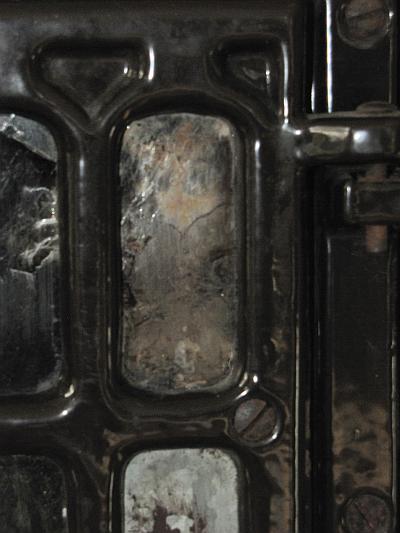
photo - mw
_______________________
The Spy
By César Aira
Recommended by BOMB
Translated by Alfred Mac Adam
If I were a character in a play, the lack of true privacy would arouse in me feelings of profound mistrust, disquiet, suspicion. In some way—I don’t know how—I would feel the silent, attentive presence of the audience. I would always be aware that my words are being heard by others, and if that can actually fit in with some parts of my dialogue (there are intelligent things we say to show off before the largest number of people possible, and there are also times when we regret there isn’t an audience to appreciate those things), I’m sure that there would be other parts that would have to be spoken in an authentic and not fictitious intimacy. And those would be the most important parts for understanding the plot: the entire interest, the whole value of the play would be based on them. But their importance would not stimulate my loquacity; to the contrary; I would take the requirements for keeping any secrets very literally, as I always have. To start, I’d prefer not to speak. I’d say “Let’s go into another room, I have to tell you something important that no one else should hear.” But at that point the curtain would fall, and in the next scene we’d enter that other room, which would be the same stage with different decor. I’d look all around, sniff the ineffable… I know there are no seats in fiction, and in my character as a character I’d know that more than ever, because my very existence would be based on that knowledge, but even so…
“No, I can’t speak here, either… ” Of course, finally convinced that the stage would follow me to the ends of the earth, I’d sidestep the issue by saying anodyne, noncompromising things, and sacrificing the play’s interest. But that’s exactly what I could not sacrifice, ever, because my existence as a character would depend on it. So the moment would arrive when there would be nothing else to do but speak. But even then I’d resist, possessed by a horror stronger than I was! ...(more)
Electric Literature's Recommended Reading
_______________________

Jones Falls Locks 39-42
photo - mw
_______________________
Draft Manifesto For A Social Materialist Psychology Of Distress
The Midlands Psychology Group
We are a group of psychologists: clinical, counselling and academic. We have been meeting regularly since 2003. We call ourselves social materialist psychologists. This is not necessarily a formally worked-out philosophical stance. Most psychology is individual and idealist. It takes the individual as a given unit of analysis, and treats the social as a somewhat optional and often uniform context. And, in what is still at root a Cartesian move, it treats the material world as straightforwardly present, but simultaneously subordinate to the immaterial cognitions by which we reflect upon it.
It is by contrast to this that our psychology is social materialist. Social because we affirm the primacy of the social, of collectivity, relationality and community, because we acknowledge that individuals are thoroughly social: ontogenetically, in their origins, and continuously and non-optionally during their existence. And material because we acknowledge that the cognitions by which we reflect upon the world do not simply float free of its affordances, character and properties. Cognition is both social and material, rooted in the ring-fenced metacognitive resources we have acquired, the embodied capacities it recruits, and the resources and subjective possibilities our world supplies
.
By social materialist psychology, then, we do not mean to imply a me re inverse reflection of the mainstream, a negation, a futile rush to its polar opposite. Individuals exist, but their experiences are thoroughly social, at the very same time as they are singular and personal. And cognitions occur, but their relation to the material world is neither determinate nor arbitrary. Our social materialist psychology is therefore aligned – in sentiment, if not content – with other contemporary initiatives that similarly refuse the naïve separations of individual and social, experience and materiality: psychosocial studies, studies of subjectivity, process philosophy, the turns to language and to affect. In each of these perspectives (and more besides) we find resources, echoes and inspirations.
...(more)
Midlands Psychology Group
for a social materialist psychology
via Attempts At Living
_______________________
2 POEMS
Leora Fridman
They Say Give Up
the last way you tried
to know us, and come play
dire by the sea: in this game
every human must allow
another and the ocean,
must welcome each seed
that found this an occasion
to visit the sand, the sand
that has been moved
splendidly by storm
from one file to the next, the sand
that would make any mother say
can you select a career,
not by virtue of not seeing
but by virtue of more moves
away from cities
and into the traffic of daylight
and into the traffic of a town
in which nothing can be crushed
under something else
just bends again to softness
because this is all so dire
that water remains unsaid
that pebbles remain deliberate
and everyone is so widespread
that now when we actually see us
it’s an occasion for tides to run
to wrap urgent around our fingers
and talk so little under the sun
...(more)
DIAGRAM [13.3]
Leora Fridman
_______________________

photo - mw
_______________________
Poetry: This Death Is Incomplete
Amy King
boston review
All grass is flesh.
We compose from and are composed of dead stars’ enriched guts (Neil deGrasse Tyson). Adam shaped from dust. The phoenix rises from ash. Death becomes us. Poetry is the sea that cracks the frozen axe within us. It brings the Nothingness we need; Death enters the room with poetry’s spotlights—the gaps falling where they may—and causes anxiety or gives escape. Poetry can be Death’s release valve, letting it enter, creating a presence where no invitation was issued.
So the latest rash of pronouncements about poetry’s death begs: why hostility for the impotent dead? Why boast a murderous view of poetry? If pages and readings of poetry are irrelevant, why are they so remarkable? Unlike movements purporting to produce nothing in opposition to the capitalist push, poetry’s refusal to turn pure product or to quantify services rendered is threatening. Poetry surfaces Nothing; it generates and compels. Those with superficial hungers hope to harness the beast for capital gain. “I have slain the thing, the blight that creates unquantifiably.” So goes the patriarchal-hand-in-hand-with-capitalism impulse to conquer, claim, and control anything of value. Poetry refuses the harness in ways philosophers are still trying to name.
The reason we go to poetry is not for wisdom, but for the dismantling of wisdom.
–Jacques Lacan
Poetry is unto death: both simply are. Inexplicable. Unjustified. Mercurially undefined, ever present, jolting, disruptive. Poetry, in its Technicolor coat of permutations and strategic elisions, unseats the brain’s conditioned ways of processing culture in our capitalist program. It does not go gently into that good night of need and acquire, of status quo correctives, of this is how we work our lives to the bone till death. It rides in the familiar clothes of a culture that readily absorbs the rebel, but cunningly so that simple hats cannot contain it. Poetry is a deceitful thing. That protects us from eternity.
...(more)

Nayoro
(from the series Solitude of Ravens)
Masahisa Fukase
1 2 3 4 5
via
_______________________
from The Artaud Variations
Peter Valente
with Commentary by Cole Heinowitz
presented by Jerome Rothenberg
There is a Hole in things
that resists classification
and cannot be understood in the terms
that explain it
because the Hole
resists being determined
and cannot be understood as part of a system.
The noise in the head is an ache.
Doubt gives birth to invention
which sodomizes it from behind.
These beings do not exist
and yet they continue to provoke Artaud.
...(more)
Commentary by Cole Heinowitz as Part of an Introductiion
“I Piss on the Machine of Being”: Peter Valente’s Artaud Variations
The poems you hold in your hands are not translations in the conventional sense of the word. They emerge from a deeply personal, sustained, and rigorous engagement with Artaud’s corpus, taking the “Interjections,” composed during Artaud’s confinements at Rodez and Ivry-sur-Seine (1946-47), as their immediate point of departure. Like Christopher Logue’s Homer, Paul Schmidt’s Rimbaud, and Stephen Rodefer’s Villon, Valente’s Artaud builds on the Poundian tradition of “criticism by translation,” a practice that demands “an intense penetration of the author’s sense” and “an exact projection of one’s psychic contents,” one that privileges “the fervour of the original” over semantic fidelity. Valente’s poems embody what Haroldo de Campos has called “transcreation,” a strategy of deviation from the literal that aims for “a greater solidarity with the final ‘gestalt’ of the [original] work” than can be achieved through “servile” translation. As Jerome Rothenberg phrased it, these poems are at once “commentary,” “extension,” and a “legitimate form of othering.”
...(more)
_______________________
Writing on the Margins - Pasternak/Ashbery Part I
Curtis Faville
The Compass Rose
Marginalia occupies a place in literature which we might characterize as . . . well . . . marginal. It obviously can't be considered original composition, since it exists only as running commentary upon a pre-existing text. Perhaps the most famous marginalizer (or marginalianist? - or marginal author???) in the history of literature is Samuel Taylor Coleridge, five volumes of whose marginalia have been published. Doubtless many other famous writers have written in their books, and the literary archives of many famous authors contain copies of books from their personal libraries, in which they have made various annotations. Influence--as a kind of literary tracing of effect--is best exampled through the use of antecedents, known to have exerted magnetic pull or push on other (often later) writers.
We don't think of marginalia as important, usually, because we don't regard it as original work, since by its very nature, it's parasitic, or symbiotic, like barnacles on the hull of a ship, or sucker-fish clinging to the flanks of a big shark. We tend to think of marginalia as having a kind of dependent existence upon an original body of work, though contemporary theories about new kinds of writing, generated through cooperative or collaborative means, may be challenging that old presumption. Reading recently some of the letters of James Salter, I was struck by the amount of revision his editors subjected him to. Readers seldom give much thought to it, but it's a fact that many of the most famous works of fiction in the 20th Century, were in effect collaborative efforts involving one or more editors, agents, legal copyreaders, in addition to the named authors. Thomas Wolfe's work would probably not have been publishable, without the heavy editorial involvement of Scribner's Maxwell Perkins.
One of the techniques of writing which post-Modern literature offers is the combination of texts from varying sources, appropriating fragments or shards of pre-existing texts directly into a new work. This kind of borrowing is different from plagiarism, or direct quotation (whether acknowledged or not). The source text (or parent work) isn't pirated to lend authority or content or style to a new work--but to include it in a kind of collage or sculpted assemblage, or as a discrete "specimen" of some kind. The debt one writer owes to another for this kind of literary theft or borrowing isn't usually great, though it may swing both ways, either as a bonafide salute, or as an implied censure or parody.
Writers typically are inspired by writing that has moved them. Writers are always on the hunt for new sources of inspiration, and though it may take non-literary forms, such inspiration frequently originates in pre-existing texts--and often in the most unlikely places!
Some years back, at a library book sale, I came across a copy of a book that had belonged to a well-known contemporary poet. The other book-scout who was present that day, to whom I showed the book, wise-cracked "so who is John Ashbery?" since the average person at a suburban library book sale would be about as likely to know who John Ashbery is as to know mean temperature of Bombay. The book I had found was a copy of Selected Writings, by Boris Pasternak, issued by James Laughlin as Direction 9 in his Direction series of texts from New Directions Publishing Company of Norfolk, Connecticut.
...(more)
Writing on the Margins - Pasternak/Ashbery Part II
_______________________
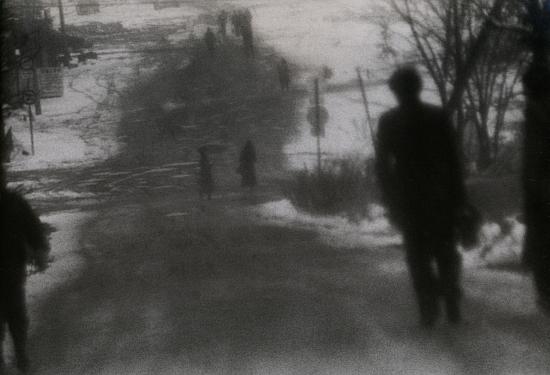
Nayoro
Masahisa Fukase
_______________________
Ugly Duckling Press' free digital proofs program
walking across
a field
we are focused on
at this time now
[pdf]
Sara Wintz
“face this way,” she said, “besides you, things change when part of a century upon
backwards inspection.” and i am part of only this one
“here, now,” the woman said as she clutched many, however impossible
meaning only to clutch a time—with relation to anyone—at herself
in a manner that speaks to people
“things change,” she said. “this too: everything.”
this amorphous den: dark, not bitter-spoken
“i want to say meaningful things.” “i want to… be meaningful.”
i want to mean something to anyone
in the park, the city-touring people. if you are going to say anything, say it at all
as anyone ever has to
“why say this”
ask me how i’d answer and i’d say that i don’t know i don’t know or only having asked
for layers contain anything
“you can’t just say anything.” “and you can’t just be anyone.”
i contain years, “i’m pretty positive.” i contain years and if years then centuries.
i am a century and i am that century.
any train has happened as any hypothetical proceeds to glow
as second thoughts do a second step
ezra pound meets hilda doolittle (1901) tenement house act (1901)
steam defeated by electric hot showers in poorly lit rooms
effusive, effervescent dancing under wires
harry partch is born (1901)
first breed of twinkling trees
birth of first movie theater, los angeles (1902)
lorine niedecker is born (1903)
heavy accent, always cold in her single story ranch home
glass and wood, as another country even now
first victrola manufactured (1906)
in any given point of departure
microcosms are defined as smallest-most
brush behind train tracks
extending everywhere
on thinking in directives and speaking to people
as in the manner of shares
as if to be part of anything that has happened in language
implicitly shared experience of language devastated
by meaning something to someone relatively substantial
exemplified by relation across yrs
as if to know anything apart from language
spread textual thoughts extend apart devastatingly into
language, record and event
(....)
_______________________
The H.D. Book by Robert Duncan.
reviewed by Aram Saroyan
In The Letters of Robert Duncan and Denise Levertov (2004), Duncan writes to Levertov as he undertakes the book that he needs to guard against letting his distress over dismissive reviews of H.D.’s work by Randall Jarrell and others deflect him from his deeper purpose. Exploring the generative resources and implications of H.D.’s work, he was surely aware too that he was also setting the course and realizing perhaps the fullest expression of his major phase as a poet. The irony is that half a century later one must guard against allowing the analogous treatment of this book to deflect attention from what is here at last.
(....)
The H.D. Book, in the end, is an extraordinary meditation on vocation and its power to subsume and reflect intricately the universe at large. Has the affirming power of tragedy, both in Oedipus and in Christ’s passion, ever been so lucidly explicated? Has Ezra Pound’s odyssey?
In the Greek myth, if Theseus looks directly at the Gorgon Medusa, he will turn to salt. The way he defeats her, in the end, is to keep track of her in the mirror of his shield. Vocation, Duncan seems to say, is both mirror and shield. And if its rules are honored, even in the face of tragedy, it provides a way of moving meaningfully through the world, “a rite de passage, a way of survival for the poet in the personal life.”
...(more)
_______________________
Triple Canopy Issue #18
active rot
after metalogue (part 2)
Boru O’Brien O’Connell
On the greater number of possibilities for disorder than for order.
(....)
D: Daddy, what's a black box?
F: A “black box” is a conventional agreement between scientists to stop trying to explain things at a certain point. I guess it’s usually a temporary agreement.
D: But that doesn’t sound like a black box.
F: No—but that's what it's called. Things often don't sound like their names.
D: No
...(more)
. _______________________

Shikotan Peninsula
from The Solitude of Ravens
Masahisa Fukase
_______________________
Prometheus Among the Cannibals
A Letter to Edward Snowden
Rebecca Solnit
(....)
They say you, like Bradley Manning, gave secrets to their enemies. It’s clear who those enemies are: you, me, us. It was clear on September 12, 2001, that the Bush administration feared the American people more than al-Qaeda. Not much has changed on that front since, and this almost infinitely broad information harvest criminalizes all of us. This metadata -- the patterns and connections of communications rather than their content -- is particularly useful, as my friend Chris Carlsson pointed out, at mapping the clusters of communications behind popular movements, uprisings, political organizing: in other words, those moments when civil society rises to shape history, to make a better future in the open world of the streets and squares.
(....)
What is terrifying to the politicians at the top is that you may be our truest patriot at the moment. Which makes all of them, with their marble buildings and illustrious titles, their security details and all the pomp, the flags, the saluting soldiers, so many traitors. The government is the enemy of the people; the state is the enemy of the country. I love that country, too. I fear that state and this new information age as they spread and twine like a poison vine around everything and everyone. You held up a mirror and fools hate the mirror for it; they shoot the messenger, but the message has been delivered.
...(more)

Seven Crows
1980
Alex Colville
(24 August 1920 - 16 July 2013)
_______________________
Call Center Lunch Room Reading Joy Harjo’s How We Became Human
Paul Lojeski
(....)
It’s bright in here. Not
the bright of your suns
but the dark bright
of progress and profit.
No windows to display
mountain hawks
or rivers jumping banks
in spring rains. Only
fake wood tables
and stiff, black chairs
and the dour stench
of chemicals seething,
the food of finality
stumbling through days
of darkness. No deer
here in a foot race
to the woods
and cool safety. No
king salmon leaping
past giant bear paws
in the gray glint
of your mornings.
Only prisoners,
tricked, defeated
and sentenced to this,
the bony carcass
of the left behind.
...(more)
Poems by Paul Lojeski 1 2
_______________________
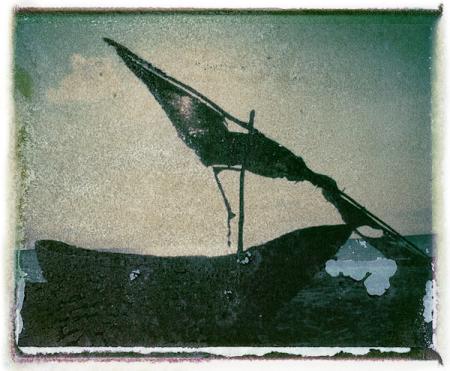
Zanzibar
Heliotropes
Laurent Villeret
_______________________
The neoliberal trap
Jodi Dean
open democracy
Credit isn’t extended to help people get ahead. It’s the means for producing securitizable debt, which means financialization (one of the key features of neoliberalism) needs poor people, poor people cut off from public services and left to fend for themselves. But there are alternatives.
_______________________
Vanessa Place’s Tragodia
Bebrowed
Vanessa Place is the scariest poet on the planet. I know this must be true because I’m quoted to that effect on the back of the two paperbacks that I’ve just bought in order to complete my reading of the above trilogy. In addition one K Goldsmith is quoted with: “arguably the most challenging, complex and controversial literature being written today”; Rae Armantrout with Vanessa Place “is writing terminal poetry” and Stephanie Hochet calls Place “etrange et forte” and “n’est pas un femme banale”.
I’ve written in the past about Place and how essential she is for the future of poetry, I’ve also been critical of some of her material that Isn’t Very Good and entered into a debate as to whether or not she has killed poetry (she hasn’t). My admiration started with reading “Statement of Facts” which immediately impressed me as strategically the most important event in poetry for many years. I probably need to explain – I’m of the view that the Poetry Problem stems from the fact that it continues to run on some notion of the poetic that was already clapped out by the end of the 16th century. This has led to the belief that radical breaks/fissures are needed to challenge and undermine this state of affairs- the Tragodia trilogy is the least compromised and most coherent of the current batch of breaks.
...(more)
_______________________
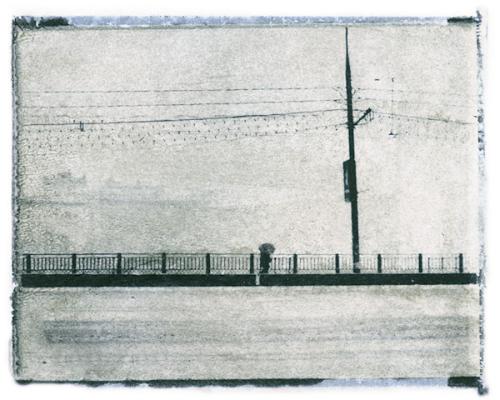
Moskva
Heliotropes
Laurent Villeret
_______________________
Dracula
Poemas del río Wang
Today I completed the translation of Umberto Eco’s History of fabulous lands and places, which was my companion during the past six months in Subotica and Tokaj, Lwów and Odessa, Czernowitz and Kamenets-Podolsk, Berlin and Mallorca, at the source of the Tisa in Subcarpathia and the Hasidic pilgrim places in Podolia, in the wooden churches of Maramure? and the painted monasteries of Bukovina, when climbing up from the Radna mountains to the Nyíres Pass, and descending from the Borgó Pass to Bistritz/Beszterce/Bistri?a. The sites he writes about are related with a particular syncopation to the sites where I translated it, the wanderings of Ulysses to the Cheremosh Valley, and the lost continent of Atlantis to Czernowitz, offering such unexpected readings of the books, which I am really sorry to be unable to share with the readers in the form of a continuous translator’s footnote.
The book, which Bompiani will publish in October in several languages at the same time (even after many years of translator’s experience, I read in an amazement the dates from the future in the colophon of a publisher’s pdf), is not just about legendary places in general, about which voluminous encyclopedias have been written, but specifically about imaginary places which were considered existing ones by the readers, who then tried to find them, even for centuries, from Atlantis to the Paradise on Earth, and from the hiding place of the Holy Grail to the unknown Southern Continent, with a special emphasis on twentieth-century mystification, from the Nazi occultism’s Thule and Hpyerborea, through the teachings of the eternal ice and hollow earth, to the stolen rubbish of Dan Brown. And in the last chapter Eco also expounds that existing places have also become the subject of successful novels, and hereby of a veritable cult. He offers a long list of examples, from Robinson’s island through Arsène Lupin’s rock and the prison of the Count of Monte Cristo to Sherlock Holmes’ house at Baker Street and Nero Wolfe’s one in New York, but – as we have already told in the posts on Eratosthenes’ well and the lion’s tail –, he would not be Eco, had he not let a juggler’s ball fall:
...(more)
_______________________

Man on Verandah
Alex Colville
1953
_______________________
Recordings of poetry: Technologies, pedagogies, institutional politics
Steve Evans, Al Filreis
_______________________
'Pathfinders' saves early digital works of the late 20th century
Pathfinders: Documenting the Experience of Early Digital Literature
via the Literary Saloon

Upper Nicholsons Locks 19
photo - mw
_______________________
from Thicket
Ulrike Almut Sandig
translated by Bradley Schmidt
asymptote
(....)
in my eyes the others sit and see everything
that I see. I only see what I can see. at night
I see the marten in the floodlights, underneath
the foxglove tree in the yard, see him motionless
becoming invisible in the fading light. I don't see
any comets. no satellites. I don't see anything
except the slivered moon and my own image
on the pane. by day I see the quickly blurred
green in the garden behind the yard, the pigeon's
mechanical nodding, always on the same bush
and I also see the plane on a training sortie above.
I hardly see the others and they hardly see me.
they sit firmly inside me.
...(more)
_______________________
The Reason I Jump
Naoki Higashida
translated by David Mitchell and K.A. Yoshida
When you look at something, what do you see first?
So how do people with autism see the world, exactly? Us, and only us, can ever know the answer to that one! Sometimes I actually pity you for not being able to see the beauty of the world in the same way we do. Really, our vision of the world can be incredible, just incredible...You might reply, "But the eyes we all use to look at things work the same way, right?" Fair enough, you may be looking at the exact same things as us, but how we perceive them appears to be different. When you see an object, it seems that you see it as an entire thing first, and only afterwards do its details follow on. But for autistic people, the details jump straight out at us first of all, and then only gradually, detail by detail, does the whole image sort of float up into focus. What part of the whole image captures our eyes first depends on a number of things. When a colour is vivid or a shape is eye-catching, then that's the detail that claims our attention, and then my heart kind of drowns in it, and we can't concentrate on anything else. Every single thing has its own unique beauty. People with autism get to cherish this beauty, as if it's a kind of blessing given to us. Wherever we go, whatever we do, we can never be completely lonely. We may look like we're not with anyone, but we're always in the company of friends.
...(more)
Asymptote - July 2013
"international journal dedicated to literary translation"
_______________________

photo - mw
_______________________
Slavoj Žižek Wrestles the Invisible Hand
at the Garden of Eden Bar
A Libretto
by Adam Smith
Michael Broek
drunken boat
Invisible Hand
Did you know, Lichtenstein produces more false teeth and sausage casings than any other country in the whole world. Eleven municipalities, each about the size of a Fiat, and low taxes, which is why Lichtenstein contains more corporations than people.
Slavoj
Sometimes I think I will take you between my great Hegelian thighs and crush you until you cannot spit up your own blood.
Invisible Hand
Then, handless, whom would you squeeze, and to what ends?
Slavoj
I don't know. I hadn't gotten that far.
(Here he begins to cry into his Slivovitz, though it is only 9AM.)
Invisible Hand
Silly Serb bastard, why are you here?
(And now a mechanically operated screen drops from the bar. The spathiphyllum, they wave suggestively. Slavoj rises in the empty bar, gesturing with his gall.) ...(more)
Drunken Boat 17
_______________________
Decolonial AestheSis: Colonial Wounds/Decolonial Healings
Walter Mignolo and Rolando Vázquez
(....)The collective conception of decolonial aestheSis that has been unfolding in various events (and that in this dossier takes the name of decolonial aestheSis), is framed in the larger project known as "modernity/(de)coloniality." It considers aestheTics as being an aspect of the colonial matrix of power, of the imperial structure of control that began to be put in place in the sixteenth century with the emergence of the Atlantic commercial circuit and the colonization of the New World, and that was transformed and expanded through the eighteenth and nineteenth centuries and up to our days.
Decolonial aestheSis is a movement that is naming and articulating practices that challenge and subvert the hegemony of modern/colonial aestheSis. Decolonial aestheSis starts from the consciousness that the modern/colonial project has implied not only the control of the economy, the political and knowledge but also the control over the senses and perception. Modern aestheTics have played a key role in configuring a canon, a normativity that enabled the disdain the rejection of other forms of aesthetic practices, or more precisely other forms of aestheSis, of sensing and perceiving. Decolonial aestheSis is an option that delivers a radical critique to modern, postmodern and altermodern aestheTics and, simultaneously, contributes to making visible decolonial subjectivities at the confluence of popular practices of re-existence, artistic installations, theatrical and musical performances, in literature and poetry, in sculptures and the visual arts.
(....)
Decolonial aestheSis departs from an embodied consciousness of the colonial wound and moves toward healing. It is a heterogeneous historico/embodied move, it perceives the wound of coloniality hidden under the rhetoric of modernity, the rhetoric of salvation. Decoloniality is at once the unveiling of the wound and the possibility of healing. It makes the wound visible, tangible; it voices the scream. And at the same time decolonial aestheSis moves towards the healing, the recognition, the dignity of those aesthetic practices that have been written-out of the cannon of modern aestheTics.
...(more)
social text_______________________

photo - mw
_______________________
Ghost Writers
Claude Bleton
Translated from French by Jean Anderson
words without borders
(....)
I wrote the title of the story, Threads of Dictatorship, lay down my pen, contemplated the ceiling and allowed silence, that parody of thoughtfulness, to settle between me and the written pages. In fact I was musing: for the first time in years, what I was writing was not a translation. A kind of giddiness seized me, I suddenly felt as if words had lost their foundations. It was essential that they be anchored, attached to something more concrete than the arbitrariness of my imaginings. I needed to return them to the care of an established author, to flee from the constant threat of disorder, to find for them, as for everything else, their proper place. Like I said, I took on translations without betraying my standards, carefully selecting texts and publishers. But this time I had not chosen the text, it had risen up like an apparition, written without a safety net. Whereas I always worked with a safety net. As a matter of principle.
The safety nets, I told myself, were the authors. The only solution, a radical one maybe, but compatible with my working methods, was to entrust this text to one of them. This would be tricky, because I would have to deal with his sensitivity and convince him that he would definitely be the author of what I had written, since I was clearly only the translator. Whom to approach? I decided to offer the opportunity to a young writer, Torcuato Escueto, who up to that point had published only poetry, some short stories, and a few professions of postmodern faith in limited circulation journals. I dialed his number.
...(more)
|



































